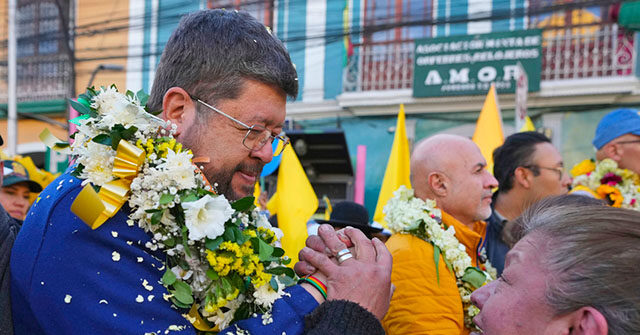Bolivia is preparing to hold a general election on August 17 that local pollsters suggest could mark the end of two decades of socialist rule in the South American nation.
Over 7.9 million Bolivians will head to the polls on Sunday to elect a new president, vice president, and members of both chambers of Congress. The election will occur at a time when Bolivia faces an extremely complex economic, political, and societal crisis marked by widespread fuel and foreign currency shortages, soaring inflation, and other consequences of the disastrous socialist administration of outgoing President Luis Arce, who chose not to run for reelection.
The election will also take place amid a years-long power struggle between Arce and his former mentor and predecessor, socialist former president Evo Morales. Morales, a fugitive from the law and suspected pedophile, fractured the ruling Movement towards Socialism (MAS) by defying President Arce, causing a schism among its politicians and followers that split MAS’s congressional majority into two.
MAS, first under Morales and then under Arce, aligned Bolivia with the world’s most notorious anti-U.S. regimes, such as Cuba, Venezuela, Nicaragua, and Iran. Experts have warned that under the auspices of MAS, Iran turned Bolivia into the “most successful” project in the Islamic regime’s decades-long plans to spread its influence in Latin America.
Arce and his socialist government have made extensive efforts to hand over Bolivia’s rich lithium reserves to Russia and China, leading to widespread local protests and an ongoing judicial process against the controversial contracts, which greatly benefit China and Russia, but not Bolivia.
Sunday’s election will see eight different candidates compete for the presidency, six of which are center-right or conservative, and only two left-wing candidates.
The last pre-election poll released by Bolivian news channel Unitel on August 10, a week before the election, revealed that MAS is poised to lose the presidency in the upcoming elections. Center-right businessman Samuel Doria Medina and conservative former President Jorge Quiroga are amply leading the race.
According to Unitel’s poll, Doria Medina would obtain 21.2 percent of the votes on Sunday against former President Quiroga’s 20-percent. All other candidates are expected to obtain anywhere between 0.5 and 8.3 percent of the votes. As neither Doria Medina and Quiroga are expected to obtain the required votes to win in Sunday’s first round, the two candidates are expected to head off to a runoff election on October 19. Unitel’s Poll also revealed that both Doria Medina and Quiroga’s respective coalitions are expected to collectively attain a majority of the seats in the Senate.
Doria Medina is a 66-year-old businessman and a former planning minister in the 1990s. This election marks the fourth time Doria Medina has run for president, this time running under the center-right Unity Bloc (UN).
If elected, Doria Medina vowed to dramatically change Bolivia’s foreign policy, steering away from Venezuela, Cuba, and Iran and embracing relations with the West, with special emphasis on the United States.
Among other policies, Doria Medina promised to implement spending cuts and austerity measures to “stop the economic bleeding” caused by the government, including overhauling local laws and courts to fight against corruption. Doria Medina is also promising to implement an economic openness agenda that abandons the state-run model and facilitates foreign investment.
Former President Jorge Quiroga, 65, briefly served as head of state between August 2001 and August 2002 to complete the remainder of the term of late President Hugo Banzer, who resigned after he was diagnosed with lung cancer. If elected, Quiroga vowed to carry out a “seismic shift” to undo the “20 lost years of socialism” under Evo Morales and Luis Arce.
Quiroga, running under the conservative Freedom and Democracy (Libre) coalition, promised to break Bolivia’s “submissive” alliance with Venezuela, Cuba, and Nicaragua and implement sweeping law reforms that attract foreign investment and free trade agreements with other countries, including Europe and China. Quiroga also proposed to establish cooperation with the United States’ Drug Enforcement Administration (DEA) to fight against drug trafficking.
The pro-Luis Arce half of the ruling MAS party will be represented by 36-year-old former Minister of Government Eduardo del Castillo, who stepped down from his government position in May to run for president. Del Castillo reportedly presented himself as the face of MAS’ “renewal” and promised to continue the socialist party’s “process of change” and oppose conservatives. According to Unitel, Del Castillo is only expected to receive 1.5 percent of the votes.
Leftist Senator Andrónico Rodríguez, who currently presides over the Bolivian Senate, is running under the Popular Alliance (AP) socialist coalition. The 36-year old senator is widely described as a younger “apprentice” and new political heir of Evo Morales. He has promised to rebuild Bolivia’s fractured leftist factions after MAS’s schism. According to Unitel, Rodríguez is expected to obtain 5.5 percent of the votes.
Morales claimed on Tuesday that Rodríguez allegedly suggested Morales could be his vice president, an offer that, Morales said, “offended” him because he “has dignity.”
Morales, who is presently avoiding authorities on pedophilia and statutory rape accusations, used several legal loopholes and dubious court rulings to bypass Bolivia’s two-term limits and ruled the country from 2005 until his voluntary resignation in 2019.
Morales unsuccessfully attempted to run for president for a fifth time until the nation’s top court reiterated in May that he is term-limited and cannot run for president again. Morales called on his supporters to boycott Sunday’s election by casting blank votes and claimed that he would fight “the battle in the streets” in the event of a right-wing victory.
Doria Medina, Quiroga, Del Castillo, Rodríguez, and other presidential candidates will hold their final campaign rallies on Wednesday. In accordance with Bolivian law, the 2025 election campaign will end on Wednesday and a mandatory electoral silence period will begin on Thursday at midnight that prohibits all electoral propaganda across traditional and digital media.
Christian K. Caruzo is a Venezuelan writer and documents life under socialism. You can follow him on Twitter here.
Read the full article here


